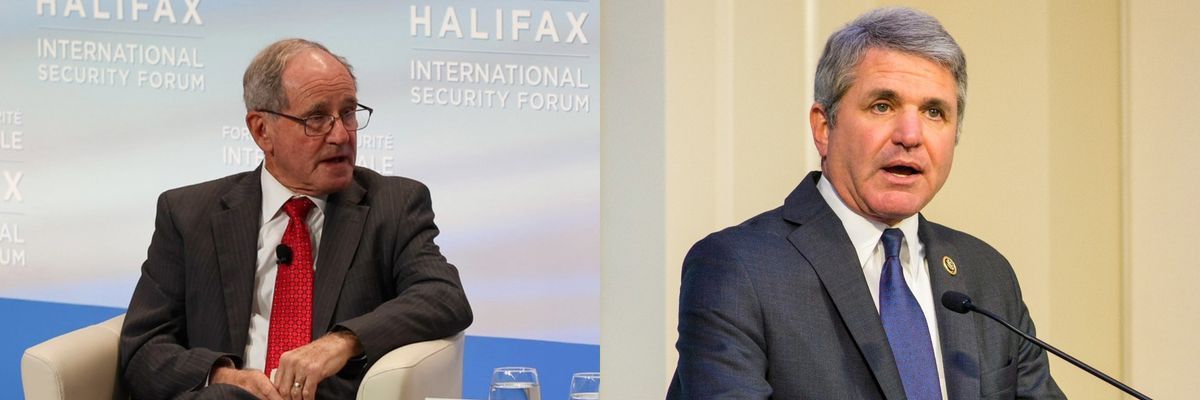Rep. Michael McCaul (R-Texas) and Sen. Jim Risch (R-Idaho) slammed the Biden administration’s approach to Ukraine, arguing in an open letter that the White House has “failed to articulate a strategy outlining how U.S. assistance to Ukraine will help them achieve victory over Russia, while also prioritizing and advancing American interests.”
“A pledge to support Ukraine ‘for as long as it takes’ is not a strategy,” wrote the powerful lawmakers, each of whom is the top Republican in their chamber’s foreign affairs committee.
The letter appears aimed at reframing Republican calls for a strategy to end the war, which have grown increasingly loud in recent months amid polls showing a drop in support for continuing to arm Ukraine.
While other GOP lawmakers have argued that President Joe Biden is giving too much to Kyiv, McCaul and Risch contend that the White House has sent aid at a “deliberately slow pace” in a way that “stops short of helping Ukraine decisively defeat Russian forces.”
Notably, the missive also took aim at reports of talks between former U.S. officials and current and former Russian leaders, which the administration claims not to have approved.
“These meetings have not been briefed to the House Foreign Affairs Committee and Senate Foreign Relations Committee. That is unacceptable,” McCaul and Risch wrote, noting their concerns that Ukrainians were not involved in the talks. “[A]s it is Ukrainian—not American—soldiers fighting, it would be reprehensible to exclude Kyiv from discussions about its own future.”
The letter revives the debate over the reported talks, which NBC News first revealed back in July. The discussions reportedly included former high-level U.S. officials and, on at least one occasion, Russian Foreign Minister Sergey Lavrov, marking the closest equivalent to direct talks between Moscow and Washington since the early days of the war.
The Biden administration has so far dodged questions about the talks and denied playing any role in them, but it remains unclear whether the White House has received briefs from the former officials who participated.
The lack of clarity should come as no surprise given the secretive nature of the discussions, which reportedly included talks about issues that have become taboo in Washington, including potential concessions to Russia.
“We suggested setting up a number of diplomatic channels in order to satisfy the desires of all the parties involved,” one participant in the talks told the Moscow Times in late July. “There firstly needs to be a serious U.S.-Russia channel, as these are the only two countries powerful enough to negotiate security in Europe. There must of course be a channel between Ukraine and Russia, another between Russia and the EU; and one between Russia and the Global South.”
Track II diplomacy — sometimes known as “backchanneling” — is a common practice in international politics in which influential non-government stakeholders in different countries hold secret talks in order to exchange views. It is often difficult to determine whether any government has formally approved such discussions.
But Risch and McCaul are determined to get answers. The pair of lawmakers asked the administration whether it knew about the talks in advance, whether the White House received readouts of the discussions, and who participated in the effort. They also demanded to know if the talks have had any influence on U.S. policy.
While Risch and McCaul make clear that they seek a maximalist approach to the conflict and oppose talks of any sort, their questions indirectly get at the heart of whether the Biden administration is prepared to seek a diplomatic end to the war short of an all-out Ukrainian victory.
The powerful Republicans gave the administration until early November to respond to their questions. They did not, however, demand that the answers be given in an unclassified format, meaning that the responses may never become public.
- Ukraine War 'peace talks' this weekend — but Russia not invited ›
- Diplomacy Watch: Did Boris Johnson help stop a peace deal in Ukraine? ›
- What will new Speaker Johnson do about Ukraine-Israel aid? - Responsible Statecraft ›
- Diplomacy Watch: Western pressure on Ukraine grows - Responsible Statecraft ›
- None ›
- Advocates demand Biden de-classify Ukraine strategy | Responsible Statecraft ›
















